Everything you eat affects the way your body functions.
Unhealthy foods like processed items or those loaded with saturated fats can negatively impact your well-being, especially if you have a kidney condition.
Natural foods loaded with vitamins and nutrients, like fresh vegetables, whole grains, and organic plant-based milk, can help you manage your health and keep you feeling great.
However, even these foods can impact your health if you have a kidney condition like Chronic Kidney Disease.
If you have any type of kidney condition, you may wonder if your favorite foods and drinks, like almond milk, are good for your kidneys.
In this article, we’ll explore the pros and cons of almond milk for kidneys to help you decide whether this popular non-dairy beverage is right for your health.
How Almond Milk Supports Kidney Health
Almond milk offers several benefits for kidney health. It supports a plant-based diet and a healthy lifestyle, which benefits those with normally functioning kidneys and kidney conditions.
For those with chronic kidney disease (CKD) or kidney stones, some almond milk is low in minerals that can cause significant health problems.
Support a Plant-Based Diet
A universal pro of almond milk is that it supports a plant-based diet.
Almond milk is the most popular non-dairy beverage worldwide, making it readily available in stores and supermarkets.
It supports a vegan, vegetarian, or whole foods plant-based (WFPB) lifestyle, which has been shown to:
- Lower blood pressure
- Improve heart health
- Maintain a healthy weight
- Prevent Type 2 Diabetes
- Decrease certain cancer risks
- Boost brain health
Good for Heart Health
Another universal benefit of almond milk is that it can support good heart health. This is especially important for those with CKD.
Heart conditions, like high blood pressure and heart disease, are a major contributing factor to the development of or poor health related to CKD.
For heart health, almond milk is low in cholesterol and saturated fat, both of which can contribute to heart problems.
For example, one cup of 2% dairy milk contains 3.1 grams of saturated fat and 19 mg of cholesterol.
Alternatively, a serving of Elmhurst 1925 Unsweetened Almond Milk contains only 1 gram of saturated fat and 0 mg of cholesterol.
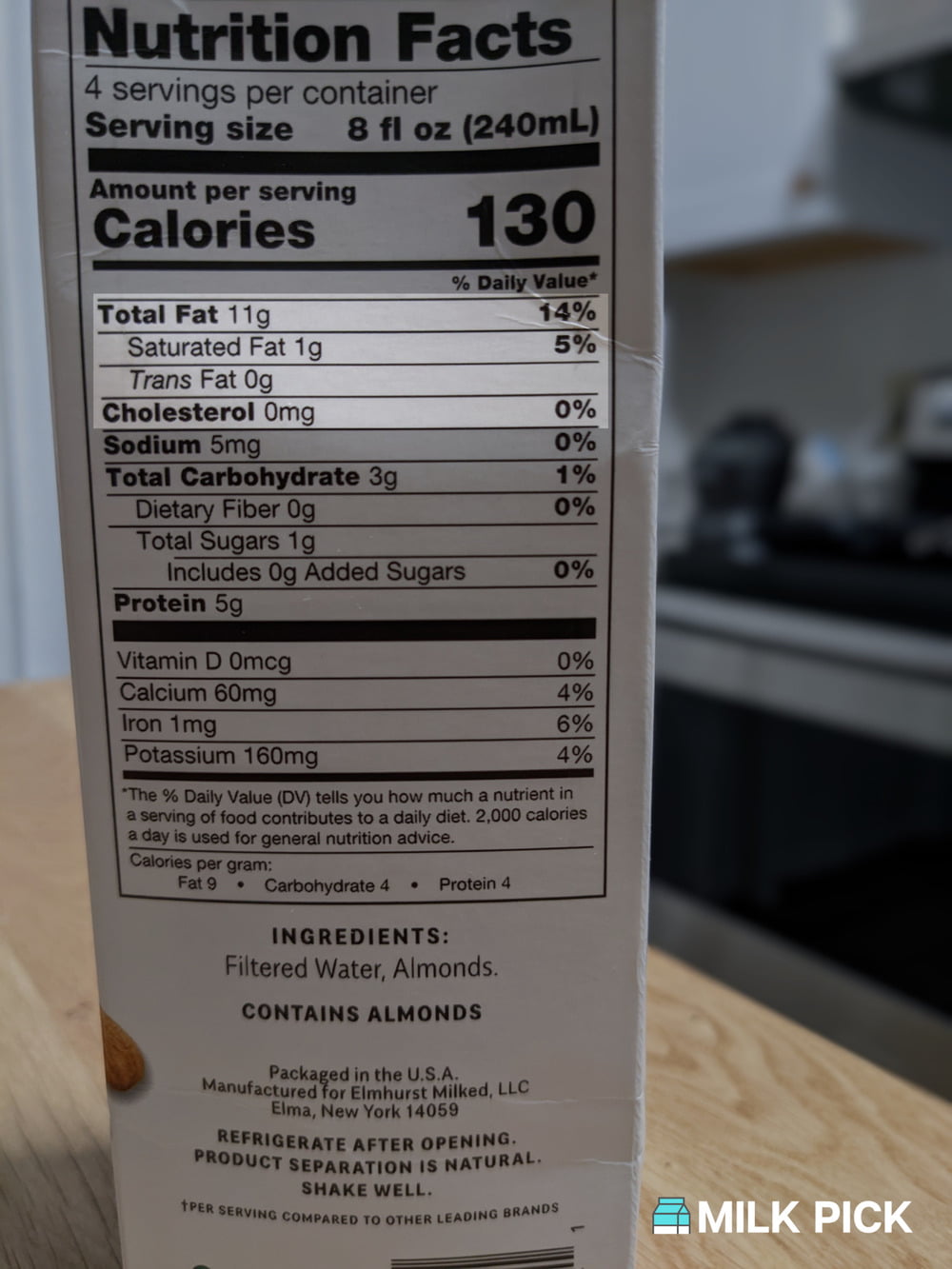
Three Trees Unsweetened Almond Milk has 0 mg cholesterol and 1 gram of saturated fat.
Beneficial for CKD
Unsweetened almond milk can be beneficial to those with CKD in managing the condition and preventing further damage.
If you have CKD, your doctor will likely recommend a diet low in sodium, potassium, and phosphorus.
With CKD, these minerals can build up in your bloodstream, causing serious health problems.
Almond milk can help because it’s naturally low in the following:
Low in Sodium
Almond milk brands that don’t contain additives are low in sodium.
A low-sodium diet helps those with CKD reduce fluid retention and lessen the impact of sodium on the heart.
It’s recommended to consume foods with fewer than 300 mg of sodium per serving if you have CKD.
2% cow’s milk contains 116 mg, which is below the recommended amount; however, sodium can quickly add up in other areas of your diet.
Unsweetened almond milk only has between 5 mg (Elmhurst) and 10 mg (Three Trees), making it a better option.
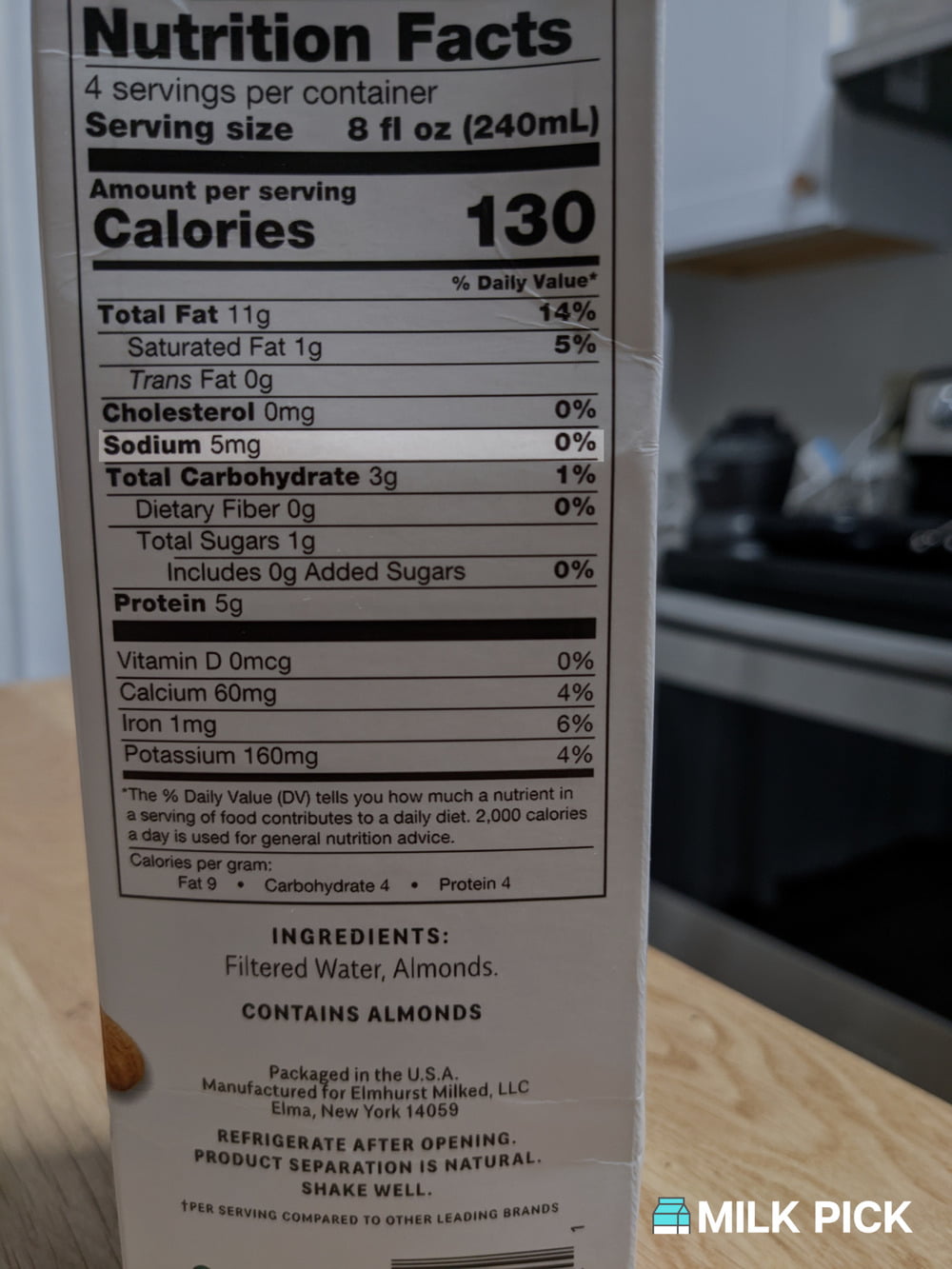
Low in Potassium
While potassium is beneficial to the health of people without CKD, those with the condition can experience adverse effects from consuming too much of this mineral.
Potassium buildup can lead to abnormal heartbeat or heart attack if over-consumed.
A cup of 2% dairy milk contains about 344 mg of potassium per serving.
If you drink more than one cup daily, that’s nearly 700 mg of this mineral.
On the other hand, additive-free almond milk only contains about 125 mg (Three Trees) to 160 mg (Elmhurst) of potassium, helping you keep your potassium levels in check.
One brand that's particularly low in potassium is Mooala—just 50 mg. However, it's fortified with calcium (10% DV) so you should consult with your doctor before adding it to your diet.
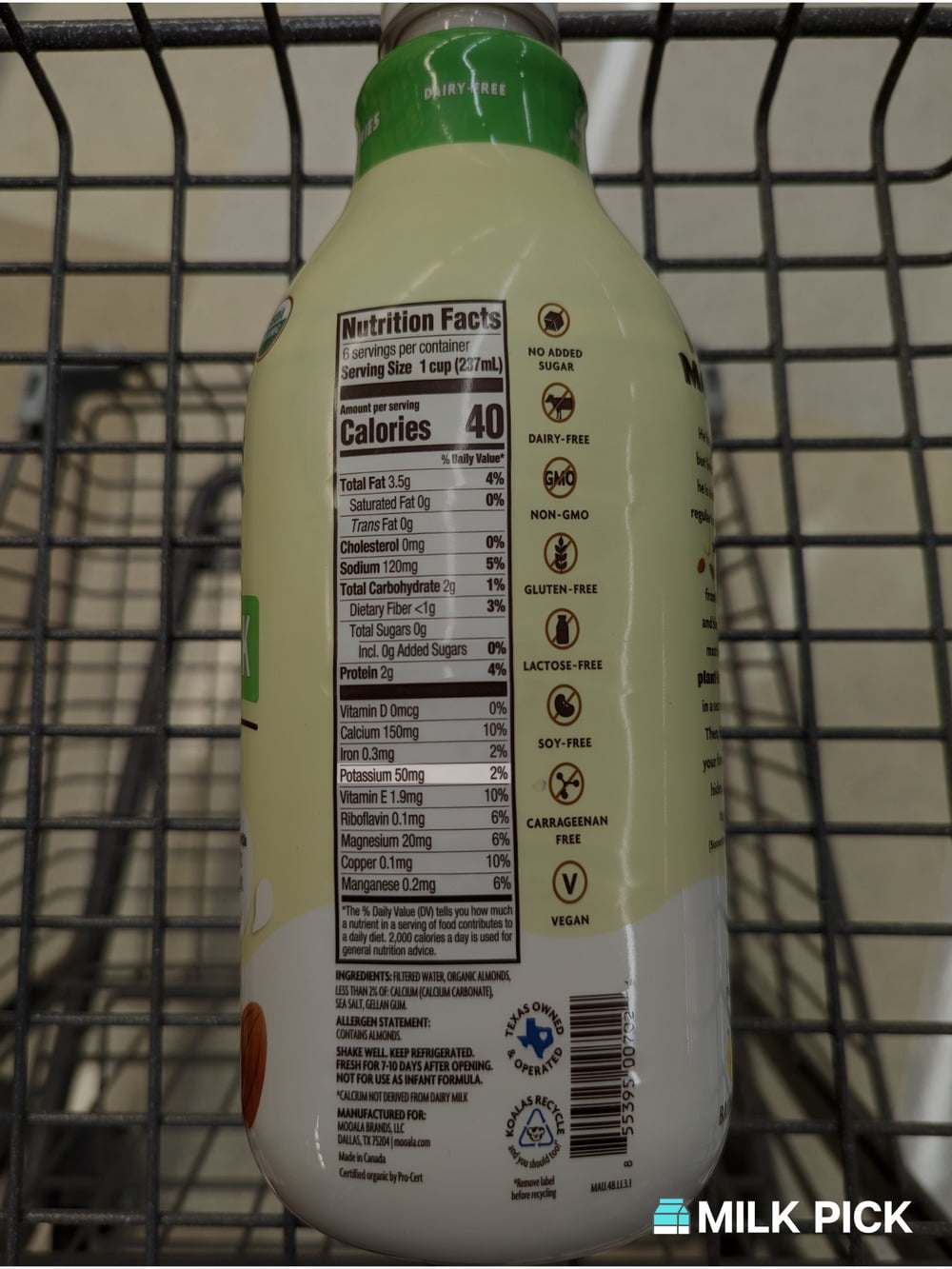
Low in Phosphorus
For those with late-stage CKD, phosphorus can prove damaging to the body.
When phosphorus builds up in the body, it negatively impacts kidney function.
When your kidney can’t filter out excess phosphorus, your body can’t absorb calcium.
To compensate, it begins to pull calcium from your bones, which can lead to weakened bones or bone disease.
Additive-free almond milk contains so little phosphorus that it’s not listed on the nutrition label, making it an ideal option for those with CKD.
Two-percent dairy milk, on the other hand, contains about 226 mg of phosphorus, meaning you’d need to limit the amount you consume each day.
Related: Is Almond Milk Good For Your Bones?
Beneficial for Kidney Stones
Almond milk can also help prevent the formation of painful kidney stones in most people.
Kidney stones can form when a diet consists of many processed foods or excess sugars.
Consuming animal-based protein also increases a person’s risk of developing kidney stones.
Unsweetened almond milk can help reduce the amount of sugar in your diet to prevent kidney stones.
It also offers plant-based protein, somewhat comparable to the amount of animal-based protein found in cow’s milk.
For example, Elmhurst Unsweetened Almond milk has 5 grams of protein and only 1 gram of sugar per serving. Three Trees Unsweetened Almond Milk has 4 grams of protein (8% of RDA) and only 1 gram of sugar.
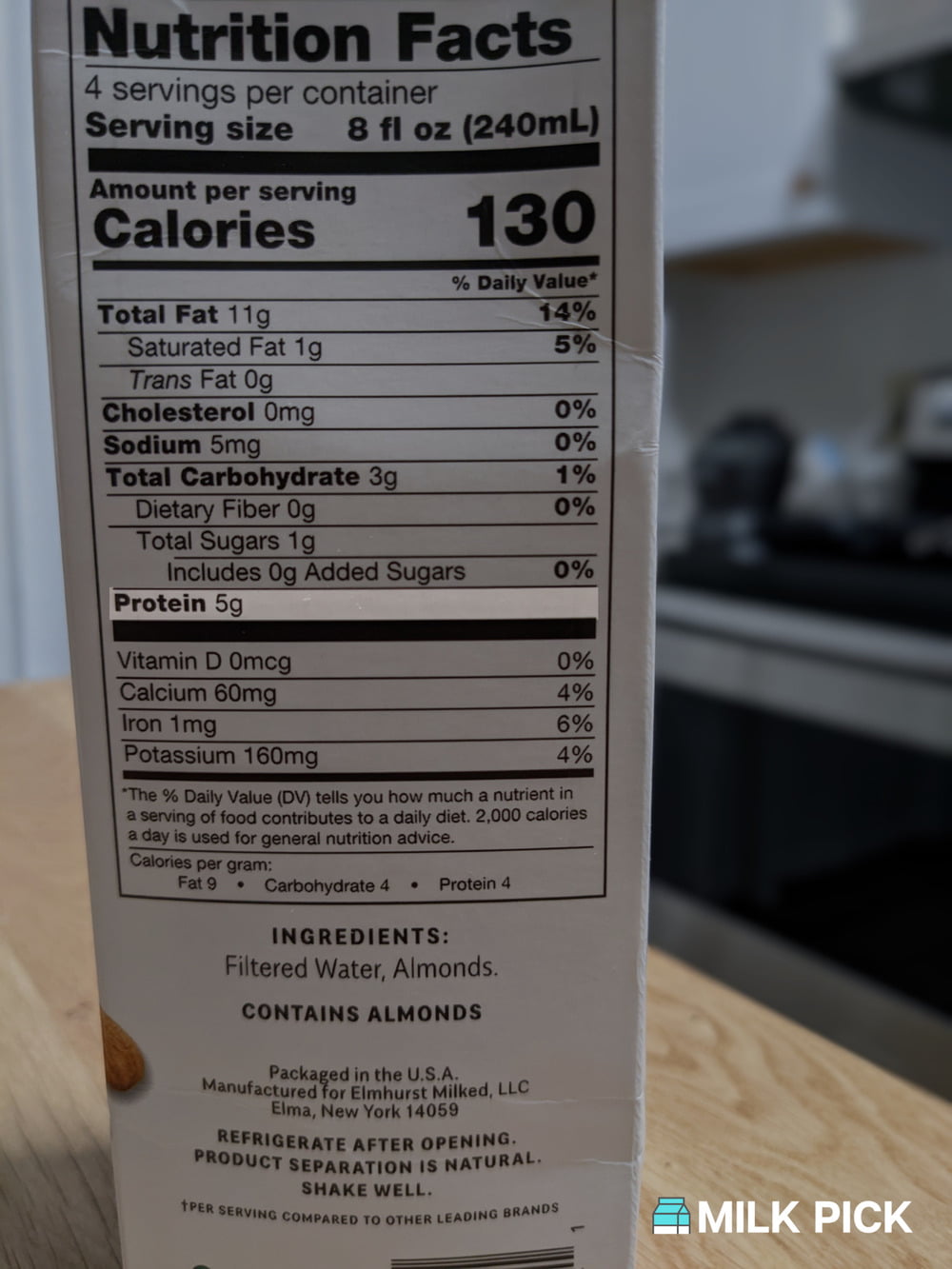
Compared to 2% dairy milk, which has 12.4 grams of sugar and 8.2 grams of plant-based protein, almond milk is the better option if you’re concerned about kidney stones.
Cons of Almond Milk For Kidney Health
When consuming unsweetened and additive-free almond milk, there are likely few cons regarding kidney health for people with or without kidney conditions.
In general, all-natural almond milk offers many health benefits and can help maintain your kidney health.
However, it’s essential for people with CKD or kidney stones to carefully consider almond milk nutrition before purchasing it.
Some almond milk contains additives or sugar, which cancels out any potential benefits of the drink.
Check the label when buying almond milk. If you see the following ingredients, steer clear and opt for an organic or additive-free option:
- Potassium citrate (added potassium)
- Dipotassium phosphate (added phosphorus and sodium)
- Added sugars (may appear as sugar, dextrose, sucralose, fructose, or other names)
- Tricalcium phosphate (added phosphorus)
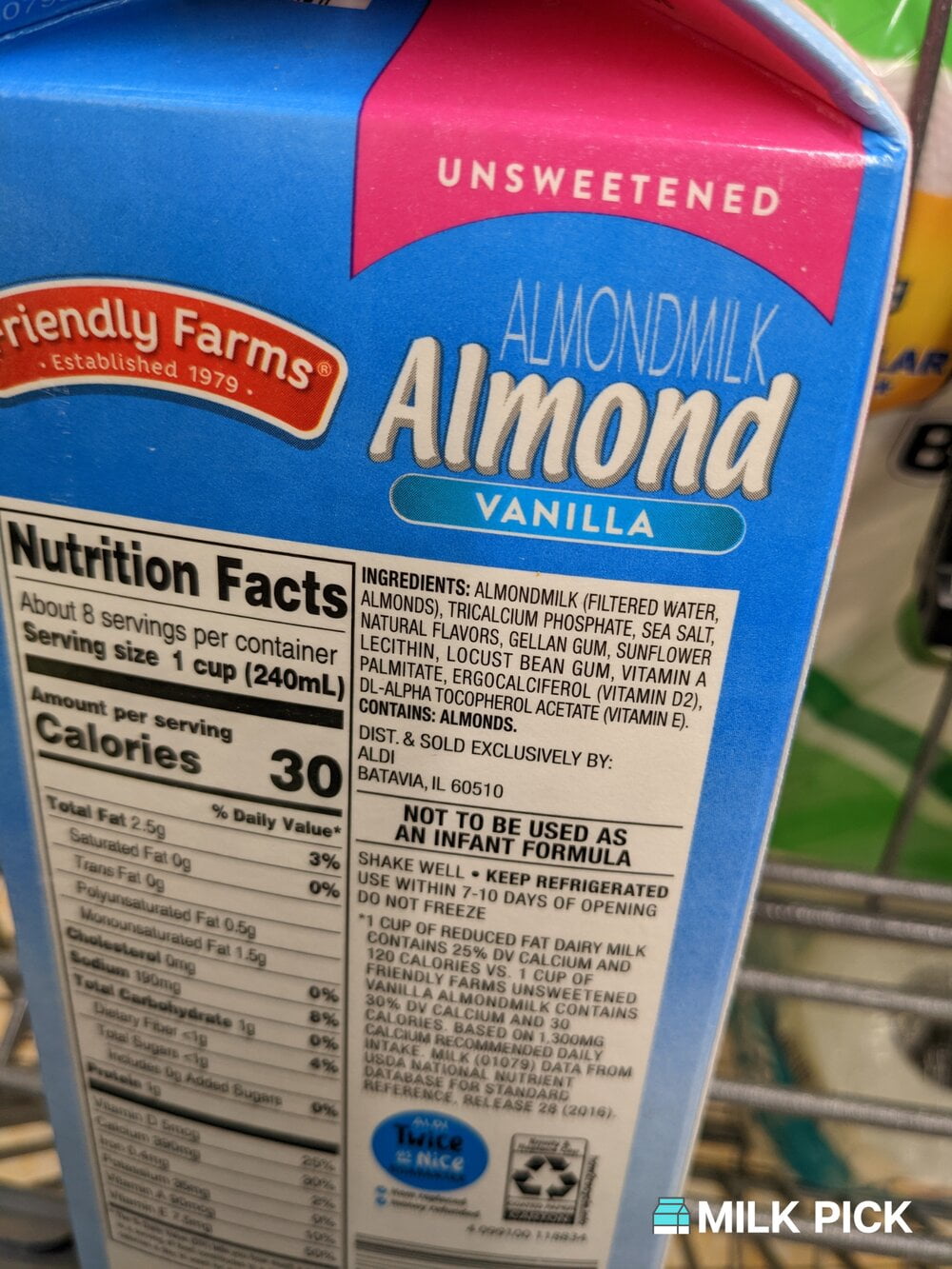
What Do Kidneys Do In the Body?
Your kidneys are small organs in your abdomen, just underneath your rib cage.
They sit on either side of your spine and act as a waste removal factory for the body.
They remove extra fluids and waste from your bloodstream, pass it into your urine, and retain helpful elements like calcium, sodium, and potassium for your body to use.
Your kidneys also help control your blood pressure through hormone regulation and stimulate red blood cell production.
Kidneys are significantly affected by the foods you eat.
Some foods help them function properly, while others can hinder or even damage these small but essential organs.
If you have a kidney condition, they are extra sensitive to the nutrients and vitamins you put into your body, so it's vital to understand how these foods impact kidney function to maintain your health.
Common Kidney Issues
Several kidney conditions affect millions of people worldwide.
Chronic kidney disease (CKD) and kidney stones are two of the most common kidney conditions.
Chronic Kidney Disease (CKD)
CKD affects about 37 million U.S. adults, about 15% of the population.
Many people with CKD don’t show outward symptoms and are unaware that they have the condition.
CKD refers to a condition in which your kidneys suffer lasting damage, which usually worsens with time.
CKD is often caused by high blood pressure or diabetes.
When you develop CKD, it causes further internal damage because your kidneys cannot filter excess fluids and waste out of your body.
Some people with CKD experience kidney failure, leading to the need for dialysis or a transplant.
While you cannot reverse damage to your kidneys, implementing a diet designed to minimize further damage can help keep the damage from worsening.
This is why it's important to understand how foods like almond milk affect kidney health.
Check out this video from Mayo Clinic to learn more about kidney disease:
Kidney Stones
Kidney stones are another common kidney condition. About 6% of women and 11% of men in the U.S. develop a kidney stone at some time.
Kidney stones are hard mineral deposits that form inside your kidney and can cause intense pain and require surgical intervention.
Kidney stones are typically caused by excess body weight and poor diet.
Although most people who develop kidney stones pass them naturally, they are extremely painful. If you have a kidney stone, you may experience the following:
- Severe pain in your back and sides
- Burning while urinating
- Discolored urine
- Nausea or fever
Kidney stones can mostly be prevented with healthy lifestyle and nutrition choices.
These include drinking enough water throughout the day, eating oxalate-rich foods, and reducing the amount of animal-based protein in your diet.
Final Thoughts On Almond Milk and Kidney Health
In general, almond milk can have many benefits for kidney health. It’s:
- Low in fat and cholesterol
- Supports a generally healthy, whole foods plant-based diet
- Offers vitamins and minerals for healthy kidney function
Those with kidney disease or other conditions can also benefit from drinking almond milk, provided it is additive-free.
It’s naturally low in phosphorus, potassium, sodium, and sugar while offering plant-based protein and other minerals.
If you have CKD or another health condition, speak with your doctor or nutritionist about which almond milk brand might be right for you.
